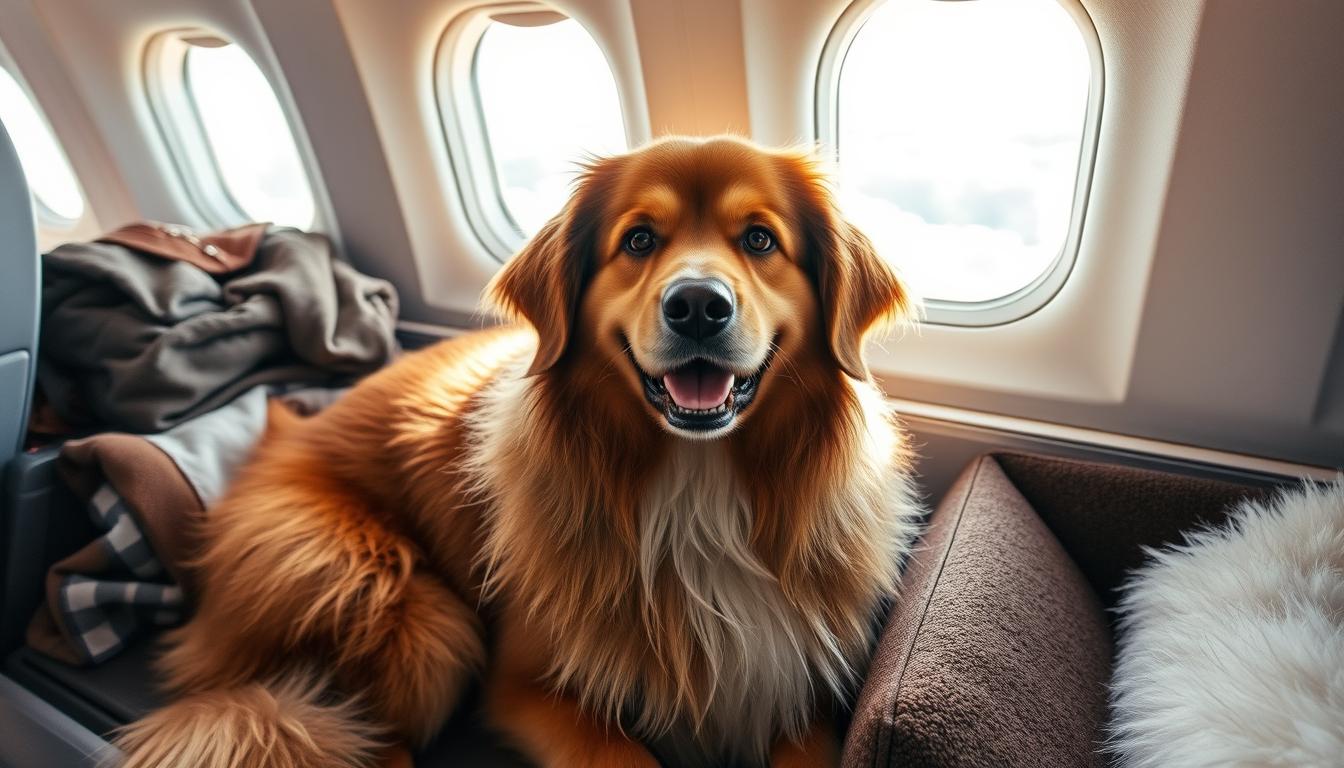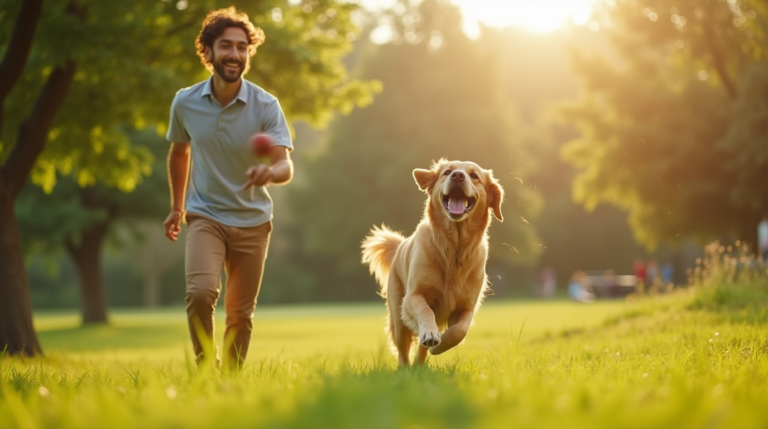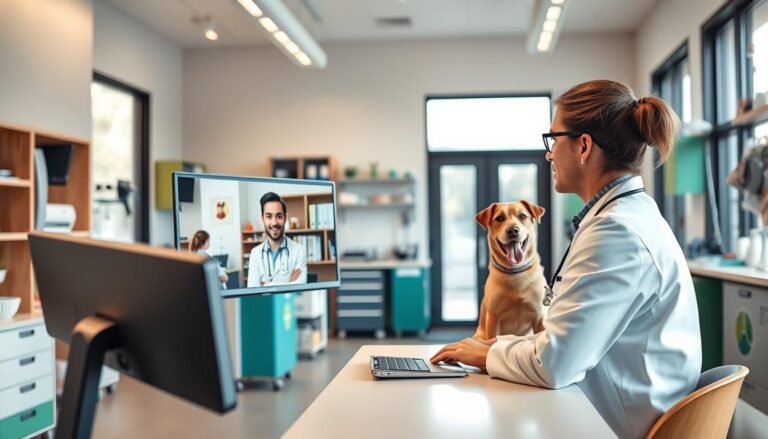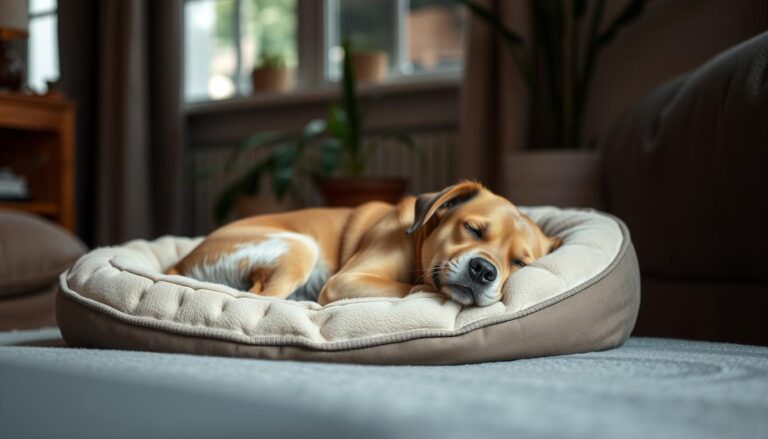As a pet parent, flying with your dog can be thrilling yet scary. Whether your dog is a service animal, therapy dog, or a family member, air travel can be tough. But with the right steps, you can make the trip smooth and stress-free for both you and your dog.
Table of Contents
This guide is here to help you fly with your large dog smoothly and happily. We cover everything from before you fly to what to do during the flight. We’ve got you covered every step of the way.
Preparing for Air Travel with a Large Dog
Traveling by air with a large dog requires careful planning. You need to know airline rules, health needs, and crate requirements before booking. These steps help ensure a smooth trip for both you and your dog.
Cabin vs. Cargo
Airlines have strict rules for large dogs. Small pets can fly in the cabin, but large dogs must go in the cargo hold. The cargo area is pressurized and temperature-controlled for their comfort.
Health and Vaccination Requirements
Airlines want proof your dog is healthy and up-to-date on shots. This is usually within 10 days of flying. Some airlines also require a microchip for identification. Meeting these health standards is key for a safe trip.
Crate Requirements
The crate your dog uses must meet airline standards. It should be IATA compliant, allowing your dog to move freely. The crate must also be well-labeled and identified.
| Airline Policy | Cabin vs. Cargo | Health Requirements | Crate Specifications |
|---|---|---|---|
| Varies by airline | Large dogs typically travel in cargo | Health certificate, vaccinations, microchip | IATA-compliant crate with proper ventilation and labeling |
Learning about these requirements and preparing accordingly will make your air travel with your large dog easier. It ensures a stress-free journey for both of you.
Packing Essentials for Your Large Dog’s Flight
Getting ready for your large dog’s flight means packing smart. Make sure your dog’s crate is stocked and carry important items in your carry-on. These details can make the trip smooth and comfy for your pet.
Approved Pet Carrier
The crate for your dog must follow airline rules. It should let your dog stand, turn, and lie down easily. Also, it must be secure and have good air flow to keep your dog safe and happy.
Crate Labeling and Identification
Label the crate with your contact info, your dog’s name, and a photo. This helps airline staff find your dog and care for them on the flight.
Leash, Collar, and ID Tags
Remember to pack your dog’s leash, collar, and ID tags. These are important for airport checks and when your dog needs a walk.
Food, Water, and Medications
Bring enough food and water for the trip, and any medicines your dog needs. It’s smart to have a little extra in case of delays.
Comfort Items and Cleaning Supplies
Include a familiar item like a blanket or toy in the crate. Also, pack potty pads and cleaning stuff for any accidents.
By packing these essentials, you can make your dog’s flight as comfortable and stress-free as possible. Research approved carriers, label the crate, and bring all needed supplies for a successful trip.
| Essential Item | Purpose |
|---|---|
| Approved Pet Carrier | Provides a secure and comfortable space for your dog during the flight |
| Crate Labeling and Identification | Helps airline staff easily identify your dog and ensures they receive proper care |
| Leash, Collar, and ID Tags | Necessary for airport check-in, security procedures, and walking your dog at the destination |
| Food, Water, and Medications | Ensures your dog’s basic needs are met and any necessary treatments are available |
| Comfort Items and Cleaning Supplies | Helps keep your dog calm and comfortable, and provides for any unexpected situations |
“Investing in high-quality essentials from trusted brands can greatly enhance the comfort and safety of large dogs during air travel.”
At the Airport: Checking In and Security Procedures
When you’re checking in large dogs for flights, get to the airport early. This lets you finish all the paperwork and get your dog ready for the trip. The check-in steps can differ based on whether you’re flying within the country or abroad.
For flights within the U.S., you’ll need a health certificate from a vet, valid within 10 days. Airlines also have rules about the size of your dog’s crate. It must be big enough for your dog to stand, turn, and lie down easily.
The security procedures for flying with dogs are pretty simple if you know what to do. Your dog will have to come out of its carrier and walk through security on a leash. Many airports have special areas for pets to go before and after the flight.
To make security go smoothly, have all your papers ready and follow the airline’s rules. Being well-prepared and proactive can make the checking in and security procedures for flying with your large dog easy.
| Requirement | Details |
|---|---|
| Health Certificates | Airlines require health certificates from a licensed veterinarian, usually within 10 days before travel. |
| Crate Size Regulations | Airlines have regulations on crate size for dogs in cargo: the crate must allow the dog to stand, turn around, and lie down comfortably. |
| Temperature Limitations | Airlines restrict pet transport during extreme hot or cold weather due to health risks. |
| Cabin Space Availability | Most airlines have limited space for pets in the cabin, so advance arrangements are essential. |
“The key to a successful airport experience with your large dog is to be prepared, stay organized, and follow the airline’s guidelines to the letter.”
Ensuring Comfort and Safety During the Flight
When you fly with your large dog, it’s key to keep them comfy and safe. You need to manage the cargo hold’s temperature and air pressure. Also, make sure they stay hydrated and fed.
Managing Temperature and Air Pressure in the Cargo Hold
Airlines have rules for pet travel in the cargo hold. They don’t let pets fly in very hot or cold weather. Know the airline’s rules on temperature to keep your dog safe.
Hydration and Feeding During the Flight
It’s important to keep your dog hydrated and fed during the flight. Don’t feed them right before flying to prevent motion sickness. Make sure they have water and pack their food or meds in their carrier.
| Tip | Benefit |
|---|---|
| Provide water in a spill-proof bowl attached to the carrier | Keeps your dog hydrated during the flight |
| Bring your dog’s favorite treats or comfort items | Helps reduce stress and anxiety during the flight |
By managing the cargo hold’s conditions and meeting your dog’s needs, you can make the flight comfy and safe for them.
how to fly with a large dog
Traveling with a large dog can seem daunting, but it’s doable with the right prep. Whether for business or fun, these tips will make your journey smooth. They ensure a stress-free trip for you and your dog.
Understand Airline Policies
First, check the airline’s rules for large dogs. Airlines need health certificates for large dogs within 10 days of travel. Vaccination rules, especially for rabies, vary by destination. They also have strict rules for crate sizes and types for cargo travel.
Pack Essential Supplies
Having the right stuff is key. Make sure you have an approved pet carrier, leash, collar, ID tags, food, water, meds, and comfort items like blankets and toys. Quality products from brands like Petmate can make your dog’s flight safer and more comfortable.
Navigate the Airport
Getting to the airport early is a must with a large dog. You’ll need to fill out forms and go through security. Look for pet relief areas in the airport to keep your dog comfy before and after the flight.
Ensure In-Flight Comfort
Airlines might not fly pets in extreme weather due to cargo hold risks. Keep your dog comfortable by checking the temperature and air pressure. Make sure they drink water and eat well during the flight.
By following these tips, you can travel with your large dog confidently. With the right prep, you and your furry friend will have a comfortable and stress-free flight.
Special Considerations for Specific Dog Breeds
Traveling by air with your dog needs extra care for some breeds. Knowing airline rules and health needs is key for a smooth trip.
Breed-Specific Airline Restrictions
Some airlines have special rules for dog breeds. This is especially true for dogs with special body types. For example, Bulldogs, French Bulldogs, and Pugs might need extra care because of their breathing. It’s important to check your airline’s rules before you book.
Preparing Brachycephalic Dogs for Flight
Traveling with brachycephalic dogs needs careful planning. These dogs can have breathing problems, which get worse in flight. Here are some tips to keep your dog safe and comfy:
- Choose a crate that’s big enough for your dog to move around in.
- Keep the crate cool, as these dogs get hot easily.
- Make sure your dog drinks enough water during the flight.
- Talk to your vet about any special needs or meds your dog might need.

By knowing the special needs of your dog and preparing well, you can make flying safe and comfy for them.
International Travel with a Large Dog
Traveling internationally with a large dog is both thrilling and challenging. You’ll need to consider international pet travel requirements like vaccinations and parasite preventatives. Also, some countries might have quarantine rules.
Before you book your flight and bring dogs into the United States, research the current rules. The APHIS (Animal and Plant Health Inspection Service) website is a great place to start. It has the latest info on dog breed restrictions and high-risk countries for rabies.
- Make sure your dog has all needed vaccinations, like rabies. Get health certificates from a USDA-accredited vet.
- Look up the destination country’s pet import rules. Some might need quarantine or have special procedures.
- Learn about airline policies for big dogs. This includes crate size and weather limits.
- Be ready for delays or surprises. Pack extra food, water, meds, and comfort items for your dog.
Traveling internationally with a large dog needs extra effort and planning. But, the joy of sharing adventures with your dog makes it all worth it.
“Traveling with a large dog internationally is an exciting adventure, but it’s crucial to thoroughly research and comply with all necessary requirements to ensure a safe and stress-free journey for your furry friend.”
Aim for a Stress-Free Air Travel Experience
Traveling with a large dog can seem overwhelming. But, with the right preparation and mindset, you can have a stress-free flight. Plan ahead, invest in quality essentials, and follow the tips in this article for a smooth journey.
Staying calm and positive is key to a stress-free flight. Your dog senses your emotions, so being relaxed helps them stay calm too. Choose direct flights and travel during off-peak times for a smoother experience.
There are ways to help your dog with flying anxiety. Use familiar comfort items like toys or blankets. Also, talk to your vet about calming aids like pheromone sprays or treats.
Gradually getting your dog used to flight-like sensations helps too. Introduce them to sounds and feels of flying to make them more comfortable.

The journey begins long before you fly. Regular vet visits, a healthy diet, and plenty of exercise are important. By focusing on your pet’s well-being, you can travel confidently and enjoy the trip together.
Conclusion
With the right preparation, flying with a large dog can be smooth. Knowing airline policies is key. This includes choosing the right crate and packing essentials.
Managing the airport and in-flight procedures is also important. The tips in this article can make your journey comfortable and stress-free. This is for both you and your furry friend.
Airlines have different rules for flying with large dogs. But, knowing the best practices can help. Whether you’re flying within the country or abroad, focus on your dog’s safety and happiness.
This guide helps reduce the stress of flying with pets. With good preparation and patience, you can travel confidently. Your large dog will arrive safe and ready for more adventures together.
FAQ
What are the main considerations for flying with a large dog?
Can I bring my large dog in the cabin with me?
What health and vaccination requirements are needed for flying with a dog?
What size crate is required for a large dog to fly in the cargo hold?
What should I pack when flying with my large dog?
What should I expect during the check-in and security screening process?
How can I ensure my dog’s comfort and safety during the flight?
Are there any special considerations for certain dog breeds?
What are the requirements for international travel with a large dog?
How can I make the air travel experience less stressful for my dog?
Source Links
- How to Fly with a Large Dog: Tips and Tricks – Petmate | Petmate – https://www.petmate.com/blogs/petmate-academy/how-to-fly-with-large-dog?srsltid=AfmBOophcbwSyNVoD74CWyk2okuNYgZMvjpk4XaI6VzjmoHw0-qbYsxw
- Flying With a Dog: What You Need to Know – NerdWallet – https://www.nerdwallet.com/article/travel/how-to-take-your-dog-on-a-plane
- Flying With a Large Dog: 16 Vet-Approved Tips for a Smooth Trip – Dogster – https://www.dogster.com/lifestyle/flying-with-a-large-dog
- No title found – https://www.akc.org/expert-advice/travel/dog-airline-travel/
- How to Fly with a Large Dog: Tips and Tricks – Petmate | Petmate – https://www.petmate.com/blogs/petmate-academy/how-to-fly-with-large-dog?srsltid=AfmBOoo5zNYQfz2E4fB8zh64WWcIsiJpFNdKqAMkX35CwhqBKPbf6R-a
- How to Fly with a Large Dog: Tips and Tricks – Petmate | Petmate – https://www.petmate.com/blogs/petmate-academy/how-to-fly-with-large-dog?srsltid=AfmBOopRNqEY7CIEq7JDsvFeQyIb45wnKIu_adBMl80liwGJKzuRXHqY
- Dog Packing List: What to Pack for Your Dog – https://www.eaglecreek.com/blogs/articles/ultimate-dog-packing-list-what-to-pack-for-your-pet
- How to Fly with a Large Dog: Tips and Tricks – Petmate | Petmate – https://www.petmate.com/blogs/petmate-academy/how-to-fly-with-large-dog?srsltid=AfmBOop9_6Jax6tDAldZmGK21ucd_giJqMtswHcTHRUHliESLHNWWenN
- How To Navigate Air Travel With a Dog – https://www.thinkjinx.com/blogs/news/how-to-navigate-air-travel-with-a-dog?srsltid=AfmBOorQI7c6Et4DHecp5PvO-KdPaDusel8U06dLnryDi7W8PbbjCt9w
- How to Take Your Dog Through Airport Security – https://esadoctors.com/airport-security-with-dog/
- How to Fly with a Large Dog: Tips and Tricks – Petmate | Petmate – https://www.petmate.com/blogs/petmate-academy/how-to-fly-with-large-dog?srsltid=AfmBOophrssQJoIik-rtDOOW3rKE02FGaUyGHpGA_DVL67jEhrh1H2r6
- Traveling with a Dog on a Plane: Safety Tips for Pet Owners – https://citizenshipper.com/blog/safely-travel-with-a-dog-on-a-plane/
- Essential Pet Travel Safety Tips – https://www.allaboutpetsprovo.com/tips-for-traveling-with-pets.html
- How to Fly with a Large Dog: Tips and Tricks – Petmate | Petmate – https://www.petmate.com/blogs/petmate-academy/how-to-fly-with-large-dog?srsltid=AfmBOoqEbZRV2iVFIQME6Q3dFnNew7JRWiGa1LQzLcEEfcqrnPK3WxY5
- Airline Options for Flying with Large Dogs in Cabin – https://www.godoggo.app/post/airline-options-for-flying-with-large-dogs-in-cabin
- How to Fly with a Large Dog – https://esadoctors.com/how-to-fly-with-esa-dog/
- No title found – https://www.akc.org/expert-advice/travel/complete-guide-to-traveling-with-your-dog/
- Pet-Friendly Airline Pet Policies – https://www.starwoodpet.com/blog/pet-policies-for-all-the-major-airlines
- Tips for Traveling With Your Dog | Bond Vet – https://bondvet.com/b/tips-dog-travel
- How to Fly with a Large Dog: Tips and Tricks – Petmate | Petmate – https://www.petmate.com/blogs/petmate-academy/how-to-fly-with-large-dog?srsltid=AfmBOoq8J0CDQjWROVUUDjT2Z83uKR6ddhhHCoYgcbK6aQo9uXVyAhbr
- How to Travel with a Dog Internationally – https://www.tasteofthewildpetfood.com/training-behavior/living-spaces/how-to-travel-with-dog-internationally/
- Tips for Flying Internationally with a Pet in Cabin — She is Not Lost – https://www.sheisnotlost.com/blog/tips-for-flying-internationally-with-a-pet-in-cabin
- How to Fly with a Large Dog: Tips and Tricks – Petmate | Petmate – https://www.petmate.com/blogs/petmate-academy/how-to-fly-with-large-dog?srsltid=AfmBOoprAMAh3pIolnwri-MpJGBZL-leCKVVL-j3lVwNvXvyjPCPcuh-
- Preparing Pets for a Stress-Free Flight: Tips and Tricks – https://citizenshipper.com/blog/preparing-pets-for-a-stress-free-flight-tips-and-tricks/
- Traveling with Pets by Airplane and Car | Odie Pet Insurance – https://getodie.com/blog/traveling-with-pets-by-airplane-car-dogs-and-cats/
- How to Prepare Flying With Your Pet for the First Time – https://hiccpet.com/blogs/dogs/how-to-prepare-flying-with-your-pet-for-the-first-time
- Can I Buy a Seat for My Dog on an Airplane? – https://basepaws.com/dog-insider/flying-with-a-dog-the-rules-and-preparations







